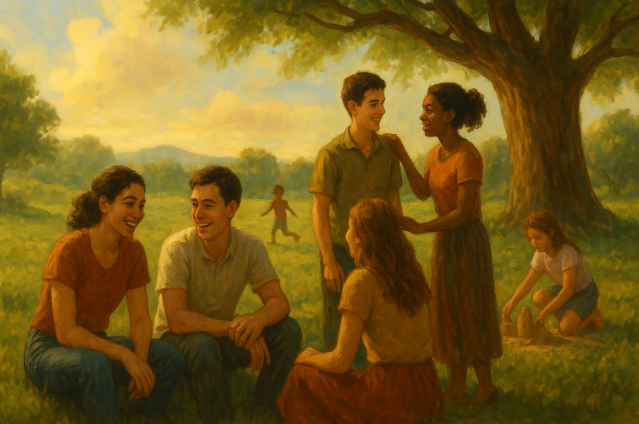
In an era of hustle and modern technology, people connect through social media applications, yet they find it hard to call even one friend when they feel low. They scroll mindlessly on their phones, appreciating the curated lives of others, but cannot sit in the company of their loved ones in real presence. This is the strange paradox of being overly connected virtually while emotionally disconnected—an “isolation era” where happiness and belonging are often sought only through virtual interaction.
Children playing and running in the fields, kids making sandcastles, and friends enjoying picnics outdoors are sights that have nearly vanished. Cozy get-togethers, warm family gatherings, and after-work meetups have been replaced by endless scrolling on a phone.
Why Does Human Connection Matter?
Humans are social beings. Connection is not merely a replacement for loneliness; it is a fundamental value of life. From tribal communities to modern society, we have always been interdependent. Good company, loving support, and encouragement are essential to living a fulfilling life.
Before we discuss how to build connections, we must understand the roots of disconnection. This unhealthy detachment has become a habit, driven by technological change, shifting cultural patterns, the relentless hustle, and fear. We live in a time when sending a message to a friend is instant, yet genuine presence is rare. Social media creates an illusion of closeness—sending a laughing emoji does not mean someone is truly laughing behind the screen.
The problem deepens with shrinking attention spans and constant mental distractions. Even when people are physically together, their minds wander into patterns of overthinking. Do you feel deeply heard in your conversations? Are you able to listen without inner noise?
Economic and lifestyle changes have furthered this disconnect. The era of shopping from local vendors—where daily interactions nurtured familiarity—has largely been replaced by online orders. Urban migration pulls people away from their hometowns, leading to isolation. Long working hours leave little room for neighborhood connections. Single-person households are also increasing.
The Impact of Isolation on Health and Mind
Human connection is a deep need—just like food, water, and shelter. The bond of love, friendship, and community releases oxytocin, lowers blood pressure, and fosters emotional safety. Think of the comfort in a genuine handshake or a shared laugh.
Many studies confirm the health risks of loneliness—research shows it can be as harmful as smoking 15 cigarettes a day. Isolation increases stress, anxiety, and vulnerability to illness.
Building Community in the Modern Age
Small gestures matter. Greeting elders, genuinely complimenting a stranger, or waving at children can plant seeds of connection. Curate small, recurring rituals—Sunday evening walks, monthly picnics, seasonal adventures, or regular cafe visits.
Join offline hobby clubs or local creative groups. Teach neighborhood children a skill. Host with love, not perfection—organize or participate in activities like sports tournaments, cooking together, or dance nights. Create safe spaces for sharing—potluck dinners, weekly meetups, birthday celebrations, or annual neighborhood gatherings.
Your courage to initiate connection can inspire others to overcome their own isolation.
Conclusion
In the era of isolation, you can choose to be a light for others. Building community takes time, courage, and care, but the rewards are profound. Through presence, shared hobbies, and heartfelt conversations, you not only strengthen bonds but also heal your own fears, social anxiety, and loneliness.
By listening attentively, playing with children, and showing genuine care, you move from being a human in an isolated room to a global citizen—contributing to collective growth and shared joy.
It is never too late to learn the art of presence and connection. Know your needs, understand why you seek human bonds, and explore how you can serve others through your existence. Let your community be a safe space filled with deep care, gratitude, and love.
